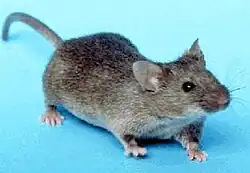二十日鼠
Japanese
| Kanji in this term | |||
|---|---|---|---|
| 二 | 十 | 日 | 鼠 |
| はた > はつ | か Grade: 1 |
ねずみ Hyōgaiji | |
| Grade: 1 | Grade: 1 | ||
| jukujikun | kun’yomi | ||
| Alternative spellings |
|---|
| 廿日鼠 鼷 |

二十日鼠 (hatsuka nezumi): the common house mouse.
Etymology
Compound of 二十日 (hatsuka, “twenty days”) + 鼠 (nezumi, “rat; mouse”),[1][2] so named for the gestation period of roughly 20 days.
Pronunciation
Noun
二十日鼠 • (hatsuka nezumi)
- Mus musculus, the common house mouse
- Synonyms: 鼷鼠 (keiso), 二十日 (hatsuka)
Usage notes
As with many terms that name organisms, this term is often spelled in katakana, especially in biological contexts (where katakana is customary), as ハツカネズミ.
References
- Shōgaku Tosho (1988) 国語大辞典(新装版) [Unabridged Dictionary of Japanese (Revised Edition)] (in Japanese), Tōkyō: Shogakukan, →ISBN
- Matsumura, Akira, editor (2006), 大辞林 [Daijirin] (in Japanese), Third edition, Tōkyō: Sanseidō, →ISBN
- NHK Broadcasting Culture Research Institute, editor (1998), NHK日本語発音アクセント辞典 [NHK Japanese Pronunciation Accent Dictionary] (in Japanese), Tōkyō: NHK Publishing, →ISBN
- Kindaichi, Kyōsuke et al., editors (1997), 新明解国語辞典 [Shin Meikai Kokugo Jiten] (in Japanese), Fifth edition, Tōkyō: Sanseidō, →ISBN
This article is issued from Wiktionary. The text is licensed under Creative Commons - Attribution - Sharealike. Additional terms may apply for the media files.